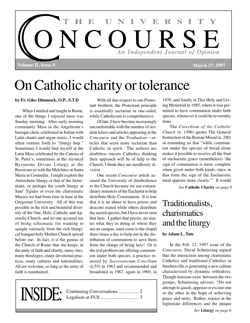The moral role of government
by Thomas E. Graham
In her recent reply to my article on capitalism, Martha Blandford writes that I seem “alarmed by the division of classes a capitalist economy supposedly creates.” I am neither alarmed nor surprised. A capitalistic economy has allowed many people to enjoy life to its fullest potential. But we must not fool ourselves into believing that all people start with the same advantages or disadvantages. It is for the disadvantaged that I speak.
I would agree with those who say that a capitalist system is the best when it comes to allowing an individual to meet many needs, both physically and psychologically. But this does not remove the moral obligation of government and individuals to help the less fortunate in society. The government and individuals must protect against human greed that will exist in any system, be it socialist, communist or capitalist.
As Pope John Paul II has stated, “I appeal to all who love freedom and justice to give a chance to all in need, to the poor and the powerless. Break open the hopeless cycles of poverty and ignorance that are still the lot of too many of our brothers and sisters.” In my last article I ended with quotes from various Popes in regard to their appeal for governmental intervention into the laws of the marketplace when injustices exist. These quotes merit serious reflection. This time I will offer some quotes from the United States bishops who voted 236-2 on November 14th, 1995 to approve a pastoral message that calls for “greater economic justice in an economy with remarkable strength and creativity, but with too little economic growth distributed too inequitably.”
A 1995 statement by the U.S. bishops’ Campaign for Human Development Committee stated: “Poverty in America is a social and moral scandal that continues to wound our nation deeply…although the causes of poverty are complex, the perpetuation of these extreme inequalities of income and wealth is unjustified.” I know that some people would like to deny that a division of class is a serious moral concern, but obviously the U.S. Bishops believe otherwise.
Mrs. Blandford criticizes me for seeming to equate economic differences with “moral inequities.” Based on their statements, it would seem that the U.S. bishops also believe that large economic disparities involve moral inequities. The bishops further remind us that “when the poor among us suffer, we all suffer. When millions of families are left powerless and without opportunity, we all are diminished as a people…action against poverty means hard work…it means speaking out whether or not it is politically popular and taking risks when the future is uncertain.”
I do not deny that movement between the social classes exists; many people have done well in spite of the odds. However, most from the disadvantaged ranks do not move without some help. Even with the help the odds are often overwhelming. The question is: Do we care enough to do something about it?
Please do not misunderstand me, I believe in this system. We have more wealth than any nation on earth. But we, as a society, can do better in dealing with the disadvantaged. And the government has a moral role to play especially when it comes to economic justice and the protection of life at all stages.
My only hope is that we realize there are injustices in our society, as there are in any society, and that solutions are not easy. It is easy for the “haves” of society to criticize the “have nots.” And it is easy for the “have nots” to criticize and blame the system. Everyone, however, shares a responsibility for helping those in need, including the government. And those in need have a responsibility as well to do something about their life situation. But sometimes the government is the only power that the masses of people have to protect them and help them against powers that sometimes exploit.
Thomas E. Graham, Ph.D.
Dr. Graham teaches in the department of Sociology and Social work at FUS.


